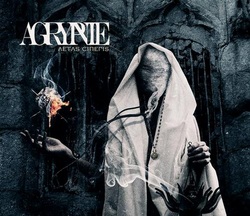
I became acquainted with Agrypnie only at Summer Breeze 2012 and immediately fell in love with their post-black music which is able to capture the listener with its fusion of sweet and melancholic melodies with involving riffs accompanied by crescendo rhythms in double bass or blast beat. Aetas Cineris does not betray the expectations, it is a wonderful album. It contains all the characteristic ingredients of the style of Agrypnie with heartbreaking melodies, arpeggios, slower staccato chords, fast parts that made you quiver with emotion. However, it is a complex album and it is not easy to listen to, and it may even scare away those who are not ready to put up with ten songs of which the shortest lasts more than eight minutes and the longest eleven minutes and a half; the songs, however, slip by easily and one is not aware of the duration. Compared to the previous album 16[485] here there is a more intensive use of keyboards and arpeggios, especially in the last song “Asche", which lasts 11 minutes and 32 seconds, and in which the first 8 minutes consist of an acoustic guitar arpeggio.
The production is great in all respects: the guitars are polished, the drums and the bass are clear and precise, and the keyboards are perfect. Perhaps a weak point is the voice: singer Torsten, der Unhold, who is also the singer of Nocte Obducta, delivers a way of singing that is a little flat and monotonous, unvaried, but perhaps this type of singing is in the mood and fits the music. Although the structure of the songs is very complicated, with the continuous succession of arpeggios, fast parts and slow parts, the multitude of overlapping lines and polyphonies, everything is well blended and one has never a feeling of fragmentation or dispersion. The atmosphere is tense, touching. The first song “Trümmer / Aetas Cineris” begins with slow piano chords, and then starts with a fast melodic riff with blast beat and tremolo, and this increases the pathos. Remarkable are also "Dezember", containing towards the end a very compelling and evocative section in mid-tempo and double bass; "Zurück" with a poignant arpeggiated riff and dreamy melodies; "Sinnflut ", sad and melancholic; "Gnōsis" and "Erwachen" are a bit more powerful and better represent the post-black side of the music of Agrypnie. I emphasize that this melancholy atmosphere that pervades the music of Agrypnie is never whining and always authentic.
The lyrics are as usual in German; the themes are deep and introspective. Many texts describe apocalyptic visions of ruined, burned cities where everything is death, and this is consequent with the title of the album Aetas Cineris. Examples of this are "Trümmer / Aetas Cineris" (Ruins / Age of Ashes) and "Dezember" (December), or the very short but apocalyptic text of "Asche" (Ashes). But these visions of ruin and destruction can be seen as self-explorations and as symbolic representations of inner desolation and existential loneliness: this is especially evident from the text of “Zurück” (Backward): “In diesen endlosen Momenten / Sind wir nichts als fahle Schatten / Durchbricht ein Flüstern laute Stille / Sticht es tief wie tausend Klingen” (In these endless moments / We are nothing but pale shadows / A whisper breaks loud the silence / It stings deep as a thousand blades).
Summarizing: a masterpiece.
Notes:
Aetas Cineris was released on February 22nd, 2013 through Supreme Chaos Records.
Tracklist:
1. "Trümmer / Aetas Cineris" 08:34
2. "Dezember" 10:52
3. "Zurück" 08:20
4. "Kosmos [Alpha]" 08:10
5. "Gnōsis" 09:04
6. "Erwachen" 09:28
7. "Sinnflut" 11:25
8. "Asche" 11:32
Personnel:
Torsten, der Unhold - vocals, guitar, bass, keyboards
René Schott - drums
Martin Kühr - guitars (rhythm)
Nathanael - bass
Eklatanz - guitars (lead), vocals (choirs) on "Asche"